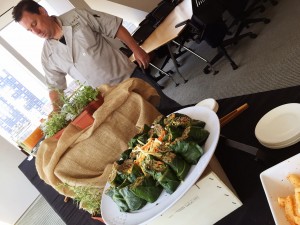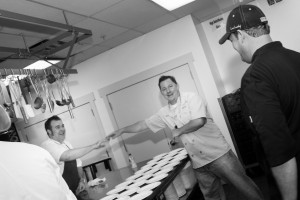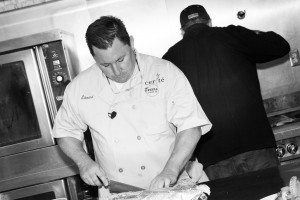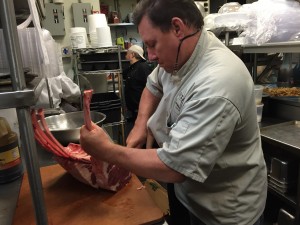Every man and his dog seem to want to set up a restaurant these days. Reality check: Two thirds of restaurants don’t survive past their first birthday. People fall in love with an idea and don’t want to learn their craft (and it is), which takes years — time and commitment.
Despite the many glamorous Hollywood portrayals, running a restaurant requires a tremendous amount of hard work and discipline. The hours are long and grueling, like in any small business, and many passionate Chefs-owners divide their time between cooking, book-balancing and recruiting like-minded staff.
Rule No. 1: Be prepared to work 80 plus hours a week.
Let’s face it, the only thing worse than food costs are employee costs.. If you leave it all to some high cost manager, you’ve more than tripled your chances that you’re going to fail.
Rule No. 2: Don’t Get Distracted
The biggest challenge I find is wearing so many hats at every moment of the day. The worst part about that is that it pulls me away from the kitchen, which is where my heart is, so I get frustrated. You need to know what’s happening in every area of your business from the kitchen to front of house & so many new issues come up at every second. But no matter what those issues are, I still have to ensure the quality of my food and service. “Check the food, don’t make the food.”
Rule No. 3: Quality Control
Mistakes stay in the kitchen. Ensuring quality and consistency in the kitchen is essential for a successful restaurant. Even if service is busy, it’s not an excuse for platters of food leaving the kitchen that are not absolutely perfect.
If it’s not good enough, don’t serve it – it could ruin your reputation. Check, double-check, and triple check before anything leaves.
Rule No. 4: Stay Consistent
It’s all a challenge, but staying consistent is probably the biggest because there are so many moveable parts. You have to almost be possessed about making people happy, which really means doing whatever possible to make that happen. When dealing with frequent customers, expectations have been set, and most clients will know the dish better than the person making it.
Rule No. 5: Pay Attention to the “Boring” Stuff
Then there’s all the stuff that’s way behind the scenes that customers don’t see. But they are so important because without them, even if you have the best food and service in the world, the place isn’t going to function. The legal foundation of the business, the banking, the finances, insurance, bookkeeping, payroll, HR, setting up your utilities accounts so you have electricity and gas — all the things that allow you to operate every day. You take that for granted when you work for a hotel or restaurant group because it’s all built in and someone else deals with it. When you’re an independent restaurant, you’ve got to do it all.
Rule No. 6: It’s Always About the Guest
The most important thing to remember is that the guests keeps your doors open, not your ego. We strive every day to create something that both staff and guests can believe in. Even though I may not particularly like the way something is prepared—if my client wants it, they get it. Sometimes, this may be the hardest part. The customer IS truly King (& Queen).
Rule No. 7: Keep it clean and organized
The cardinal rule of cooking: your kitchen must be clean & spotless. There’s nothing worse than an unsanitary kitchen, and disorganization in the Kitchen will result in food inconsistency. This goes double for paperwork. The amount of systems in place to keep a place our size running like an efficient machine, boggles the mind. Lack of Department of Health compliance can create unneeded stress and loss of time—which you can’t afford.
Rule No. 8: Surround Yourself with the Right People
Building a team who all have the passion for the same goal is not easy. Sometimes it’s hard finding people who are willing to work in a small, hot, unglamorous kitchen. I am really happy with my team now, but it did not come easy. In this business you have to continue to train your assets. Sometimes it’s better to say goodbye, but investing time in an employee who is willing to learn and grow with you, and shares a passion for the common goal is priceless. Never let employees get content or comfortable. They must be a passionate as you are about the product, the customer, and constantly learning.
Rule No. 9: Don’t Be Cheap
Buy the best you can afford in terms of food. People can tell the difference when you have high-quality ingredients, made from scratch, and 95% of your product doesn’t come from a can. This can set you way apart from your competition. Knowing your COG (Costs of Goods) percentages can guide you if you are doing this correctly. If they are too low, quality can be low. If you raise a bit where there is room, you can increase the value. If they are too high, well….
Rule No. 10: Set Aside a Stash of Extra Cash
For someone trying to open a small restaurant on a limited budget, make sure you have ‘burn’ money for the first few months when you are still trying to figure everything out. You also need to have cash set aside to make it through any slow seasons during the year.
Rule No. 11: CATERING IS MUCH DIFFERENT
With catering, basically every night you are setting up and breaking down a restaurant. The food changes, the venue changes—everything about it changes. It can be exciting, but it can be extremely frustrating. You’re loading up trucks, going to events, setting them up, breaking them down and going back to the store. It can take an entire van of equipment just to cater an event for 20 people. There are a lot of details involved and it’s all about organization. If you are in the middle of nowhere and forget coffee cups, people can’t drink their coffee. A single mistake on your part can ruin a client’s entire event.
You have to control food amounts. All your profit can be in the leftovers that you are dragging home or leaving with your client. Send too little, you’re in trouble. Send too much, the client thinks they were oversold. Additionally, when you provide massive amounts of food, you have to master the maintenance of a high standard food quality.
Unlike restaurants that people can walk in and see the ambiance, people have to envision what your catering style will be like. Pictures on your website—of both foods you make and parties you’ve thrown—can help people envision what you can do. Another crucial factor: How you interact with clients before they’ve ever seen or tasted your food—make sure your Event Planners (or just yourself) are top-notch, creative and professional. You have to be constantly creating and making new items. Constantly come up with new dishes that deliver the Wow factor, as well as developing new dishes to keep existing clients fresh will keep you in business.
Be in love with it. I love what I do–I can’t imagine another path to take. It is the most rewarding business when done well. The joy you bring to the client and guests gets you through the most difficult of days.
Rule #12: Have a Serious Set of Master Skills
You must have a Master set of skills to run a restaurant and to make money while you’re at it. If you don’t have these skills, or at least are willing to learn them… or plan to be an absentee Owner…. Just take a match to the money you are planning on (or are) investing, and save yourself some stress.
-
- Family Support Massive Culinary Experience (only a small part of this list)
- Strong Time Management FOH Restaurant Experience
- Tight systems monitoring Retail service experience
- Microsoft & QuickBooks proficient DOH Certified
- POS (whatever you use) proficient Recipe conversions
- P&L & Cash Flow Statements Portion & costs breakdowns
- Basic Accounting principles Creativity
- Social Media knowledge Good Palate
- Bi-Lingual Delivery logistics
- Managing a diverse staff A good teacher/ training staff
- Negotiations with Landlords Motivator
- Labor Law understanding Troubleshooter
- Governmental Tax Law understanding Great hygiene & health
- Mingling with clients Stamina (5 hours sleep average with no breaks)
- Basic plumbing, electrical & carpentry skills You Can’t be Broken
___________________________________________________________________
- Massive Culinary Experience (only a small part of this list)
- FOH Restaurant Experience
- Retail service experience
- DOH Certified
- Recipe conversions
- Portion & costs breakdowns
- Creativity
- Good Palate
- Delivery logistics
- A good teacher/ training staff
- Motivator
- Troubleshooter
- Great hygiene & health
- Stamina (5 hours sleep average with no breaks)
- You Can’t be Broken





